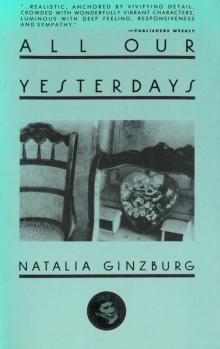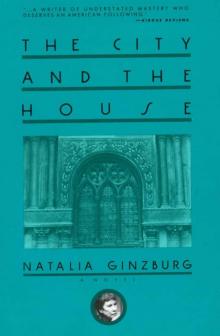- Home
- Natalia Ginzburg
The Manzoni Family Page 24
The Manzoni Family Read online
Page 24
So they were preparing for their departure. But at the beginning of September Teresa fell ill. She had been unwell for a while, she felt ‘extremely weak and shattered into fragments and tiny pieces’. Manzoni wrote to Rosmini: ‘Unfortunately my wife’s health makes it impossible for us to travel to Lesa.’ Teresa sent for Doctor Mazzola, who had operated on her for tonsilitis years before. Then other doctors were called. A tumour was diagnosed. Stefano Stampa told the story: ‘and so the poor lady was treated with frictions of mercury and with iodine; but the tumour grew instead of diminishing, and her health deteriorated . . .’ The winter months passed and Teresa became more and more poorly. The doctors felt her hard, swollen stomach and perceived movements, which were, according to them, ‘rumblings of the lower intestine which sometimes lifted the tumour and shook it’. In the night of the 7th to 8th of February she was gripped by atrocious pains. It was the tumour bursting, said the doctors. They bled her. They said it was the end. She believed them and announced it to her son ‘with a sad smile’. Suddenly they all realized that they were labour pains. The first doctor, Mazzola, had at one time advanced the hypothesis of a pregnancy, but without conviction because of Teresa’s age (she was forty-five) and besides, the others had immediately spoken of a tumour. Twin girls were born. In the night Manzoni had sent for an obstetrician, Doctor Billi, but he arrived when it was all over. ‘He arrived in time to baptise one of the twins who lived almost till the morning, and to baptise the other sub-conditione because it was still-born, or died as soon as it was born. Then in a whisper Doctor Billi asked Manzoni (who was standing near the fireplace, behind a screen which was hiding the light and the fire from the patient) if he might take home the little dead body (I think it was five or six months) to put it with his collection of foetuses. Manzoni looked embarrassed; he made a movement of the head that looked like consent, and the doctor put the little body in his pocket and took it home. But Manzoni never divulged this fact to his wife, nor did the son to his mother, for they were both convinced that she would have been distressed’ (Stefano Stampa).
When the first baby died too, they cut a lock of her hair, which Manzoni placed in an envelope; on the envelope he wrote:
‘And you who have no name, but are the blessed daughter of the Saviour in heaven, look down from there in blessing on your parents, who wept for you and envied you. Teresa and Alessandro Manzoni.’
Vittoria was given the task of communicating the event to the family; she wrote to the ‘zietta’: ‘Papa would like to write to Uncle to inform him of a great event which occurred last night; but as he feels rather tired after being up all night, he has asked me to write for him. Just think that our poor invalid, to everyone’s astonishment, was delivered of all her tumours last night by giving birth to a beautiful baby girl, who, poor little thing, is already an angel, as she survived only nine or ten hours. We were all up all night, consumed with anxiety, as nothing like this was suspected so we thought the poor invalid was in a very bad way indeed. . . We passed from the appalling fear of an incurable disease (as the doctor had spoken an hour before of colic of the uterus) to the relief of seeing the trouble vanish in a moment! . . . Things are going well now, and the patient is doing quite nicely. Heaven be praised! Dear Sofia is better, but her pain has been quite severe these last days.’
On 31 March that year Sofia died. She had taken to bed in February. The doctors said she had developed an obstruction of the pleura. Like Cristina, she was happily married. She had an affectionate, kind, sensitive husband and four beloved little children. Before her stretched a happy, festive prospect, full of colour, friendly faces, solicitous relatives, and she lavished attention on others, her brothers and sisters, the babies that were born to her, the objects and the foods she received and sent. Yet this world which seemed to her so beautiful could not exclude the memory of the loved ones she had lost. She would be gripped by a fit of terror. She was always so tired! Then suddenly the beautiful lakes, mountains, villas, boat-trips, were all plunged into darkness. ‘Of my state of mind I have made it a rule to speak as little as possible, because I bore other people, and do myself no good, so glissons, which will be better for everyone. . .’
Vittoria
In the summer of 1841 Vittoria was nineteen; Matilde was eleven. Vittoria left school; Matilde stayed there.
The adolescent Vittoria was different from her sisters, because she was stronger, healthier, more vital. She was not beautiful, but attractive, with fresh, healthy colouring, and a slim, robust, agile form; le petit écureuil, the little squirrel, Stefano called her. But she was at once beset by misfortunes: by the death of her sister Cristina, then her grandmother, and a few years later her sister Sofia, she found herself deprived of the only people who offered her maternal affection. She quickly lost her rosiness and her fresh vivacity and strength, and became a melancholy girl, easily moved to tears, often ill, without much will to live.
Cristina had died in the spring of 1841; Vittoria had nursed her, then returned to school; in the summer she came home, but found a very different scene: her grandmother was old; her stepmother reigned. Her brothers were ill at ease, as they had been since Teresa had come into the house: but now that their grandmother was so old and overwhelmed with grief, the unease weighed more heavily. Now it was just the house of their father, Teresa and Stefano: there was no room for anyone else. Vittoria went off to Bellagio with Sofia, Lodovico and the children.
‘I commend our dearest Sofia to you: she needs comfort and support: help each other. . . Oh my Vittoria, I love you so. . . you will understand. . . Kiss my Ninoni, repeat Nonna’s name to him, and kiss the other little angel too. Give my fondest love to my dear son, Lodovico; I feel ever greater esteem and affection for him, if possible. Your Papa sends you all lots of love too, and Donna Teresa sends her regards and Nanny sends lots of hugs.
‘My Vittoria, may God and the Blessed Virgin ever watch over you, and keep you always as you were on leaving that holy place.
‘A kiss, my dearest darling, from your Nonna.
‘P. S. I see I haven’t mentioned my health; I am as usual – cough and no appetite.’
This was how Giulia wrote to Vittoria from Brusuglio in the summer: these are the last lines of her last letter. A few days later, Vittoria and Sofia were called to Brusuglio.
Vittoria wrote to tell Matilde their grandmother was dead:
‘Oh Matilde mia, it breaks my heart to have to send this terrible news! . . . For you she really was the most loving of mothers, after ours had left us. . . how she loved you! and how she thought of you to the very end! . . . I at least had the painful consolation of being able to care for her and help her, close her eyes with my own hands and kiss her brow once more. I send you a lock of her dear hair in saddest memory.
‘You must pray God to take her noble soul straight into the glory of heaven, and ask Him, after sending us so much grief early in our lives, to prepare a little peace and happiness for us in the future. . .’
Now that their grandmother was gone Vittoria felt that Matilde had only her. Their father was self-absorbed; their brothers full of their own problems. She felt that she and Matilde were two orphans. She felt it, but would not say it. Although she had become so melancholy, Vittoria kept a deep-seated, innate warmth through life’s vicissitudes: and even in moments of bitter despair, this deep, conciliatory warmth led her to view the world as a place that was never entirely dark and inhospitable. Besides, at that time there was still Sofia; and then there was Pietro, whom Vittoria loved and thought of as her strongest support.
At that time Matilde still used the formal address to her father, as the nuns had taught her to do. She wrote to him in the autumn of 1841:
‘My dearest, most esteemed Father,
‘It was my duty to address myself to you before this, and such, indeed, was my wish, but an indisposition prevented me from fulfillng the desire of my heart, but now that I am completely recovered I cannot delay affording myself this satisfaction. I have he
ard from my dear Sisters of your excellent state of health, and of the happy issue of their journey, which gave me great satisfaction. The wise instructions you are so kind as to send me continuously, are really engraved in my mind and heart; I promise you, dearest, most esteemed father, to practise them better than I have done in the past.
‘The last day of last month we did our examinations in the presence of His Eminence who in his great goodness, pronounced himself perfectly satisfied. Be so kind as to present my duty to dearest Mother, and accept the respectful filial affection which always affords me unspeakable satisfaction. . .’
About Matilde, we know that she had fair hair and complexion and blue eyes. It is not difficult to imagine this gentle, judicious little girl, brought up by the nuns, writing her little letter to her father in her beautifully neat, precise, uniform hand. How remote her ‘most esteemed Father’ and ‘dearest Mother’ must have seemed! And how remote and severe the ‘wise instructions’ that reached her from her father! The nuns had told her that her father was there to guide her on the right paths, and ‘dearest Mother’ was there to offer tenderness and motherly warmth. But from her father she received these ‘wise instructions’ which she felt she must learn by heart like school lessons; and from Teresa she had never received anything that gave her pleasure or that she managed to recall. And she had seen so little of both of them! However, she acquiesced in the nuns’ teaching out of obedience, but saw no real sign of it about her. At eleven Matilde, perhaps more certainly and clearly than Vittoria, knew that she was an orphan, and admitted it to herself.
Vittoria went off to live with Sofia at Verano. Sometimes she stayed in her father’s house, but uneasily, and for short periods. Writing her memoirs years later, she adduced a reason for this unease: Stefano. ‘Dear Stefano, always so kind to me! yet it was chiefly because of him that, as a girl, I preferred to live in casa Trotti than in casa Manzoni. When I came home from the convent, I found this new brother; there was something in his show of brotherly affection that I did not care for. I discovered later that he had discussed with Lodovico the idea of making me his companion. When I heard this, I backed away so that he never revealed this notion of his to me. As I said, poor Stefano was so good, so upright, religious, and not lacking in intelligence, but. . . so dull! Lord, forgive me for never having been able to bear dull people! When I think how bored I would have been if I had married Stefano, I thank You for arranging a different future for me!’
However, even if he had confided these vague matrimonial projects to Lodovico, Stefano always maintained that his feelings for Vittoria were purely fraternal. It may be that, in thinking of marrying Vittoria, he wished above all to marry into his mother’s ambience; and thereby please her. Mistakenly, no doubt, for Teresa, who so much wanted him to marry, would not have considered Vittoria a good choice. She would have thought her unsuitable for Stefano, delicate, and somehow unworthy of him. However, between Vittoria and Stefano there were never any precise words or acts leading to a sentimental attachment. And the fundamental reason why Vittoria did not like living with her stepmother and her father was probably that she felt herself a stranger in the house. Her relations with Teresa were not particularly bad, and they even became quite good later when she was far away in another province; but they posed problems and made life bitter.
When Sofia died, the whole family went to spend a few days at Niguarda. Teresa remained in Milan, with Stefano. Manzoni wrote her a short note from Niguarda. It was the first of April; Sofia had died the day before.
‘My dear Teresa, get Stefano to send me detailed news of you. We are well.’
Teresa did not regain her strength after that birth. She lived like an invalid for a long time. She was up for only a few hours each day, and considered she was nearing the end.
Sofia was buried at Brusuglio.
At Verano, in the garden of the Trotti villa, Vittoria carved these words on the trunk of a tree:
‘Dear Verano, where I have spent so many sweet, happy days: 1841 – 42 – 43 – 44. . . Then it all finished, forever!’
Verano, the Trotti villa, Sofia, Lodovico and their four children: there in those rooms, in that garden, among those people, she had felt loved and protected, it had become her home. Now that Sofia was dead, she had to leave. And nobody in the world could give her the generous affection that Sofia had offered, at once sisterly and motherly.
She went to via del Morone, where she did not feel at home, and where Teresa ruled with her querulous, invalid ways.
Then she succumbed to a serious attack of bronchitis. The family feared she would meet the same fate as her sisters.
At that point tante Louise intervened. Her intervention was precious and providential.
Tante Louise and her husband, Massimo d’Azeglio, had been living apart for two years. Even when they were in love, in the first years of their marriage, he was often away from home; he liked to roam the countryside, as he had done as a boy, with a little group of friends, in search of landscapes to draw and paint; he would spend the night in dirty little flea-ridden taverns, climb stony tracks on the back of a mule, venturing through woods and wading mountain streams; he sent affectionate letters to his wife, with minute descriptions of his days and the people he met; he bewailed the distance that separated them, and commended the little girl to her, little Rina, whom she was bringing up as if she were her own child; every letter ended with a loving sentence to them both: ‘now I wrap you both up in a ball and give you lots of kisses.’ Gradually, when they were together, relations between husband and wife became sharp and irritable, his absences grew longer, and his letters colder; finally they stopped living together, every now and then he would come to see her, for the sake of his little girl for whom he felt a great bond of affection; the child remained with tante Louise, who surrounded her with every care and affection, as she had always done, for which Massimo was grateful to her. Manzoni, too, regarded her with respect and gratitude for the same reason, and the times when tante Louise and the Manzoni family had been on bad terms seemed very remote.
In 1845 tante Louise was thirty-nine. She had a generous nature and liked to make herself useful to others. She considered her help was indispensable to Vittoria, and suggested to Manzoni that she would take her away somewhere, for a change of air and ambience. She was preparing to spend some time in Tuscany with little Rina. Vittoria could go with them. Relieved and grateful, Manzoni accepted.
So tante Louise, Vittoria and little Rina set off. They went to Genoa, La Spezia, and then Pisa, where la tante had taken an apartment.
Costanza Arconati, in a letter to Mary Clarke, pronounced herself delighted that Vittoria had finally sortie de ce taudis de sa maison paternelle and affirmed that the ‘Marquise d’Azeglio’ was a second mother to her. Costanza Arconati could not stand Teresa. She felt that wherever Teresa was, everything became constricted, dreary and oppressive. The house in via del Morone seemed to her un taudis [a hovel], a black, airless, oppressive hole. It was certainly true that, at that time, the house was a rather gloomy place, with Teresa unwell, Stefano worried about her state of health, Manzoni anxious and tired, and sad memories wherever they looked.
Vittoria sent little presents to Teresa, from her travels, and asked her father for news of her, which was always bad. She wrote long letters to Pietro describing her new life. Just as Sofia had always been close to Enrico, Vittoria had always been close to Pietro from her earliest childhood.
Vittoria to Pietro, in May, from Pisa:
‘La tante is making me take English lessons from an excellent lady-teacher here; and I’m having other lessons too. . . As Aunt is so fond of riding, and there is nowhere where this exercise could be more enjoyable than here, where there are extraordinarily beautiful rides in a place called Le Cascine, I thought I would go with her, and I am having riding lessons. We have very fine, comfortable rooms on the Lung’ Arno: I have met some of the nicest people you could imagine: and yet, however I force myself, I can enjoy none of
this; the slightest pleasure is always followed by profound bitterness. . .’
She confided her every thought to Pietro. He was both father and brother to her. ‘My dear Pietro, you told me at a tremendous moment, that our poor Mother had commended us all to you in the last days of her life; only two little sisters are left to you, poor Pietro. . .’ The idea that Matilde, some not-so-distant day, would have to leave school in her turn, filled her with anguish. What would become of her? how would she live in that house, now so different from what it had been? ‘Poor Matilde! I pray God may not reserve for her the sad youth He prepared for me! . . . From now on I may say mine is almost over.’
Yet it was Vittoria’s natural instinct to look for something to afford her some immediate consolation, and reconcile her to life, when it seemed utterly dark and hostile; and in that first period in Tuscany, although she felt old at twenty-three, jaded in body and soul, unable to escape from her painful memories, yet the idea of her father’s fame gave her great pleasure:
‘They absolutely adore Papa here: I am never ten minutes in society without hearing his dear name ringing in my ears. . . I assure you that in spite of my physical infirmities, in spite of the even more wretched state of my morale, and the aversion and embarrassment I have always felt at being in society, I repeat I can assure you that these gentlemen manage in the end to make the time pass pleasantly for me; and they do it with a kind attentiveness which I certainly do not deserve. But it’s all done not for me personally, but rather for the name I bear – so unworthily – and I receive all these demonstrations as proof of their love and veneration for our Papa, and I rejoice inwardly, much more than if it were for me – which, besides, could never happen. . .’
‘These gentlemen’ who made ‘the time pass pleasantly’ were Giuseppe Romanelli, the poet Giuseppe Giusti and Giovan Battista Giorgini.
Giusti was then thirty-six. He was born at Pescia. He had studied law at Pisa, but had never practised. He wrote poems deriding Austria, which were printed clandestinely and circulated throughout Italy.

 Happiness, as Such
Happiness, as Such The Dry Heart
The Dry Heart The Manzoni Family
The Manzoni Family A Place to Live
A Place to Live All Our Yesterdays
All Our Yesterdays The Little Virtues
The Little Virtues The City and the House
The City and the House The Road To The City
The Road To The City Voices In The Evening
Voices In The Evening